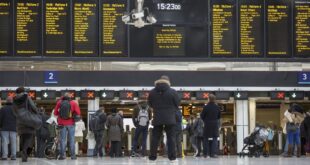undreds of thousands of workers across several sectors have voted to go on strike in recent months, including rail employees, bus drivers, teachers, Royal Mail workers, and civil servants.
Here’s all you need to know about those involved:
Rail workers
Rail unions announced on November 22 several 48-hour walkouts in December and January over their long-running dispute over pay, jobs, and working conditions.
Rail workers will next strike from 3pm on December 24 until 6am on December 27.
Read More
There will be further strike action on January 3, 4, 6, and 7.
Eurostar strikes, which the National Union of Rail, Maritime and Transport Workers (RMT) says will “severely affect” services, are due on December 22 and 23.
Train drivers across 15 rail companies will stage a fresh strike on January 5, the BBC reported the Aslef union as saying.
Of the strikes, which are estimated to cause a £300 million blow to London’s economy before Christmas, the general secretary of the RMT Mick Lynch said he was “not the Grinch”.
The BBC says passengers should check their train-operating company’s website and travel only if absolutely necessary.
The RMT is demanding a pay offer reflecting the rising cost of living — and a guarantee of no compulsory job losses.
A quiet Waterloo Station during a strike in November
/ Jeremy SelwynBus drivers
Almost 1,000 bus drivers in London employed by Abellio are to stage 10 days of strike action in the coming weeks over pay, their union Unite has announced.
The fresh strikes will take place on December 25, 27 and 31 and January 4, 5, 10, 12, 16, 19, 25 and 26.
The bus drivers have already taken 10 days of strike action in recent months.
The dispute initially involved 950 drivers, but union Unite said its membership has since doubled.
Unite general secretary Sharon Graham said: “Abellio is content to hoard mountains of cash but has imposed a completely unacceptable pay offer on its drivers.
“It is disgraceful behaviour and our members are rightly furious. Unite always fights to defend and improve members’ jobs, pay and conditions and Abellio’s south and west London workforce have their union’s unflinching support.”
Nurses and medics
About 300,000 nursing staff in England, Wales and Northern Ireland went on their second strike on December 20. The Royal College of Nursing (RCN) is set to announce more strikes for the next six months.
The British Medical Association (BMA) has asked for medics to be awarded a 26 per cent pay increase. It has said that low pay is the cause of chronic understaffing that is putting patients at risk and leaving NHS staff overworked.
If negotiations between union representatives and the administration do not start soon, additional strikes have been threatened for January.
Ambulance staff
Ambulance Strike | December 2022
Hundreds of paramedics were taking part in industrial action from midday to midnight on Wednesday, December 21 in London.
Some 10,000 ambulance workers — including paramedics, control room staff and support workers — also plan to strike across most of England and Wales on December 28.
The action by the three main ambulance unions — Unison, GMB and Unite — will affect non-life threatening calls only. The unions have demanded above-inflation pay rises, According to the BBC, the governments in England and Wales have given NHS staff an average rise of 4.75 per cent.
Royal Mail workers
Royal Mail workers will walk out during the busy Christmas period, on December 23 and 24.
This is after their previous strikes on November 24 and 25.
Postal workers belonging to the Communication Workers Union (CWU) also took industrial action on December 9, 11, 14 and 15.
Royal Mail has offered a pay deal it says is worth up to 9 per cent over 18 months — but the Communication Workers Union (CWU) is demanding more.
Civil servants
About 100,000 civil servants across more than 100 government departments are involved in strikes this month, affecting the Home Office, job centres, passport and DVLA procedures, the Border Force, and more. The military is expected to be drafted in to cover for Border Force workers.
About 1,000 Border Force staff are expected to strike on eight days between December 23 and New Year’s Eve.
Birmingham, Cardiff, Gatwick, Glasgow, Heathrow and Manchester airports, and the port of Newhaven, will be affected, the BBC reported.
Officials checking passports for people arriving in the UK are among those striking. The Government says passengers could face “serious disruption”.
Road workers have announced that they will strike over 12 days in December and January, with the action risking “ bringing the road network to a standstill”.
They will strike in different parts of England on December 22, 23, 24, 25, 30, and 31, and on January 3, 4, 6, and 7.
Driving examiners
Driving examiners will hold rolling strikes until January 16.
The Public and Commercial Services Union is calling for a 10 per cent pay rise, better pensions, job security and no cuts to redundancy terms.
The BBC has reported that the Government says the strikes might affect driving tests but not theory tests.
Firefighters
Firefighters who refused a 5 per cent pay rise are running a ballot on strike action from now until January 30.
More than 33,000 firefighters and control-room staff will vote on whether to take industrial action.
Fire Brigades Union (FBU) general secretary Matt Wrack said: “Strike action will always be a last resort but we are running out of options.
“Many firefighters and control staff are desperate. Some are struggling to afford to live. It is a dreadful and very serious state of affairs.
“We are doing everything we can to secure a decent offer. We have held talks with and written letters to many different parties, but no such pay offer has been forthcoming.”
University lecturers and teachers
On Monday, November 24, 70,000 lecturers, librarians, and researchers across 150 UK universities began three days of strike action over pay, working conditions, and pensions.
The University and College Union (UCU) said they were prepared to take “even bigger action” in the new year unless conditions improved.
The UCU wants a pay rise worth either 2 per cent above RPI inflation, or 12 per cent, whichever is higher, pension benefits restored and “excessive workloads” tackled.
Another teachers’ strike will take place in Scotland on January 10 and 11.
A 6.85 per cent increase for the lowest paid was rejected, with teachers arguing for 10 per cent
Teaching unions in England and Wales are balloting members over pay, which could mean strikes.
Education Secretary Shirley-Anne Somerville said their demands were “unaffordable”.
Shelter employees
More than 600 workers at the homelessness charity Shelter began an “unprecedented” fortnight of strike action from Monday, December 5 in a dispute over pay.
The Unite union said a 3 per cent pay increase this year had left some of Shelter’s staff still unable to pay their rent and very worried about the possibility of becoming homeless themselves.
The union accused the charity’s management of refusing to enter into meaningful negotiations.
Unite general secretary Sharon Graham said: “It is unforgivable that workers at Shelter find themselves actually being haunted by the prospect of being made homeless.
“Shelter has sufficient reserves to pay its hardworking and dedicated staff a decent pay rise but it has chosen not to.”
Other strikes
Here are some of the other disputes which have led to strikes or ballots for action:
- Physiotherapists and midwives are also being asked if they want to take industrial action.
- More than 50 security guards and CCTV operators at Harrods are set to walk out for 12 days in the build-up to Christmas, according to Unite.
- The workers in food factories that make Twiglets and Jacob’s Cream Crackers have been on indefinite strike since September.
- G4S workers, who deliver cash to big names like Barclays, HSBC, Tesco, and Asda, went on strike on Monday, December 4.
Source link


